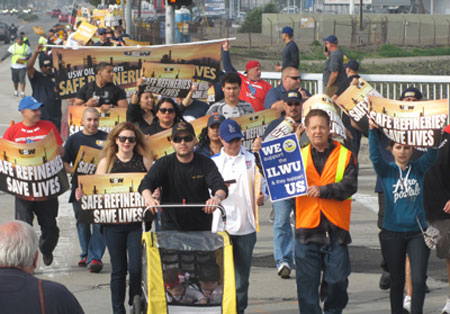TEXAS CITY, Texas — Spirited rallies at dozens of refineries around the country Feb. 7 drew several thousand oil workers and supporters as a nationwide strike centered on safety entered its second week. Some 1,400 members of the United Steelworkers union at two BP facilities in Ohio and Indiana joined the walkout the following day, adding to the 3,800 already on the picket lines at nine plants in Texas, California, Kentucky and Washington. This is the biggest strike of refinery workers in 35 years.
Four refineries are on strike in the Houston area, the largest U.S. oil refining hub.
“Marathon wants to completely run and direct safety,” Dale Battiste, a 27-year veteran at the plant and co-chair of the union safety committee, told the Militant, as 300 rallied in front of the company’s corporate office here.
“For them, it’s about profit over lives,” said Bill Patton, a pipefitter at Marathon Oil.
“It’s a lie,” Leslie Dillon said on the picket line, commenting on the safety sign you see as you enter the refinery. “I’ve been a firefighter and paramedic for 16 years and carried bodies out of there.” A massive explosion at the refinery here in 2005 killed 15 workers and injured more than 100 workers and nearby residents.
Randy Rodriguez said his father-in-law, Ray Gonzalez, was burned to death at the refinery here in 2004. Rodriguez came to a rally of 250 at the Shell headquarters in downtown Houston Feb. 6 carrying a photo of his father-in-law and a sign saying, “My Dad lost his life at work. A fair contract saves lives.”
A contingent of rail workers extended their solidarity at the rally as well. They discussed the push by rail bosses to reduce train crews to one person. Unionists came from the International Longshoremen’s Association, Communications Workers of America and United Food and Commercial Workers Union.
‘Biggest safety concern is fatigue’
“Our biggest safety concern is fatigue,” said Chris Sharpe, who works at the coker unit at LyondellBassell and is vice president of the union local. “They refuse to hire more people so we’re forced to work 13 days in a row, 12 hours a day, then one day off. It’s been like that since Thanksgiving.”
The struck refineries account for 13 percent of U.S. refining capacity. The oil bosses are operating all but one with management and strikebreaking contractors. Plants not on strike are operating under daily contract extensions.
“This strike is NOT about money, this is about addressing safety issues that have been ignored for way too long. 138 workers were killed on the job while extracting, producing or supporting oil and gas in 2012,” striking BP workers in Toledo, Ohio, posted on their Facebook page after they joined the strike at 12:01 a.m. Feb. 8.
“We had almost 300 at the main gate” for the Feb. 7 rally, Dave Martin, vice president of Steelworkers Local 8-719 at the Marathon refinery in Catlettsburg, Kentucky, said in an email to the Militant. “We still had our other three gates and the hall manned. Union members from several other locals came — utility workers, locomotive engineers, bricklayers, service and communications workers and other USW locals.”
In Carson, California, south of Los Angeles, more than 1,000 marched a mile from a community park near the USW Local 675 union hall to the Tesoro refinery to support the strike there. “We’re fighting for safety not just for us but for the community,” George Leon, 40, a striking operator, told the Militant. “Any catastrophe releases its effects on the community, not just on us inside.”
In northern California at the Tesoro refinery in Martinez, several hundred swelled the picket lines outside the plant. One handmade sign read “Standby Don’t Fly,” a protest against the company forcing workers to be on unpaid standby even on their days off.
Solidarity rallies across country
In El Dorado, Kansas, more than 100 Steelworkers and others gathered in solidarity with the strike. “We are not on strike at this refinery, but we won’t sign any agreement until the national issues are settled,” Robert Cammarn, president of USW Local 241, told the Militant.
Steelworkers in the Philadelphia area organized rallies at refineries in South Philadelphia; Trainor, Pennsylvania; and Delaware City, Delaware. At the Philadelphia Energy Solutions plant, Local 10-1 President Jim Savage, a member of the national bargaining committee, told the Militant, “The oil bosses are so arrogant. When we raise concerns over forced overtime, they say we’re not going to tell them how to run their refineries.”
In all, the union’s website reported solidarity actions at more than 200 plants and refineries.
Ellie García in Carson, California; John Naubert in Anacortes, Washington; Linda Avers in Whiting, Indiana; Mitchel Rosenberg in Philadelphia; Eric Simpson, Betsey Stone and Gerardo Sánchez in Martinez, California; Andy Parkhurst and Julie Anderson in El Dorado, Kansas; and Anne Parker in Chicago contributed to this article.
Related articles:
All out to back striking oil workers!
On the Picket Line
|
Printer-friendly version of this article |















